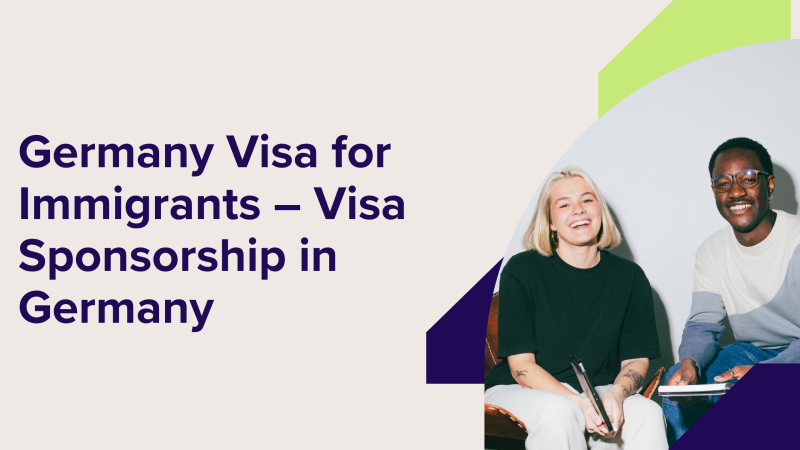Germany, with its robust economy, rich cultural heritage, and high quality of life, has become a beacon for immigrants worldwide. Whether drawn by job opportunities, education, or the promise of a stable future, many aspire to call this European powerhouse home. However, the journey to settling in Germany begins with understanding its visa system, a complex but navigable process. This article explores the various visa options available to immigrants, the requirements, and the steps to secure a pathway to life in Germany, offering a clear and practical guide for those embarking on this journey.
Also Read: 15 Caregiver Jobs with Visa Sponsorship in Australia That Pay Upto $70,000/Year
Why Germany?
Before diving into the visa process, it’s worth understanding why Germany is such a magnet for immigrants. The country boasts one of the world’s strongest economies, with industries like automotive, engineering, and technology offering abundant job opportunities. Its universities are renowned for academic excellence and affordability, attracting students globally. Germany’s social welfare system, healthcare, and commitment to diversity further enhance its appeal. Cities like Berlin, Munich, and Hamburg blend modernity with tradition, offering vibrant, multicultural environments. For immigrants, Germany represents not just opportunity but also a chance to integrate into a society that values contribution and resilience.
Understanding Germany’s Immigration Framework
Germany’s immigration policies are structured to balance economic needs with social cohesion. The Federal Office for Migration and Refugees (BAMF) and German embassies or consulates worldwide oversee visa applications. Visas are categorized based on the purpose of stay—work, study, family reunification, or asylum. Each type has specific eligibility criteria, documentation requirements, and processing times. The process can feel daunting, but with preparation, it’s manageable. Immigrants must also distinguish between temporary residence permits and permanent residency, as well as the pathway to citizenship, which typically requires years of legal residence.
Types of Visas for Immigrants
Germany offers several visa types tailored to different immigrant profiles. Below is an overview of the most common options.
1. Work Visas
Germany’s thriving economy welcomes skilled workers, particularly in fields like IT, engineering, healthcare, and trades. Work visas are divided into several categories:
- EU Blue Card: Designed for highly skilled non-EU professionals, the EU Blue Card is a popular option. Applicants need a recognized university degree and a job offer with a minimum annual salary (around €58,400 in 2025, though lower for shortage occupations like STEM fields). The Blue Card allows holders to work and live in Germany for up to four years, with a path to permanent residency.
- Skilled Worker Visa: For those with vocational training or qualifications in recognized trades, this visa targets professions like nursing, carpentry, or electronics. Applicants must prove their qualifications are equivalent to German standards and secure a job offer.
- Job Seeker Visa: This six-month visa allows professionals to enter Germany to search for employment. Applicants must demonstrate financial self-sufficiency, relevant qualifications, and a clear plan to find work. If a job is secured, the visa can be converted into a work permit.
- Au Pair Visa: Aimed at young people aged 18–27, this visa allows a one-year stay to work as an au pair while learning German culture and language. Applicants need basic German skills and an agreement with a host family.
Work visas typically require proof of qualifications, a job offer (except for the Job Seeker Visa), health insurance, and financial stability. Processing times range from 4–12 weeks, depending on the visa type and country of application.
2. Student Visas
Germany’s universities, many of which offer low or no tuition fees, attract thousands of international students annually. The student visa is for non-EU nationals enrolled in a German higher education institution. Key requirements include:
- Proof of admission to a recognized university or preparatory course.
- Financial proof (approximately €11,904 per year in 2025, often via a blocked bank account).
- Health insurance coverage.
- Basic German or English proficiency, depending on the program.
The student visa is valid for the duration of the course, with the possibility of extension. After graduation, students can apply for an 18-month residence permit to seek employment. This pathway is particularly appealing for those aiming to transition to a work visa post-study.
3. Family Reunification Visa
For immigrants with close family members legally residing in Germany, the family reunification visa offers a way to join them. Eligible family members include spouses, minor children, and, in some cases, parents of minor children. Requirements include:
- Proof of relationship (e.g., marriage or birth certificates).
- Evidence that the family member in Germany has sufficient income and housing.
- Basic German language skills (A1 level) for spouses, though exemptions apply in cases of hardship.
This visa allows holders to live, work, and study in Germany, with a path to permanent residency after a few years. Processing can take 2–6 months, depending on the complexity of the case.
4. Asylum and Refugee Visas
Germany has a long history of offering protection to those fleeing persecution, war, or violence. Asylum seekers must apply upon arrival in Germany, typically at the border or a BAMF reception center. The process involves:
- An interview to establish the grounds for asylum.
- Temporary residence during the application review, which can take months.
- Access to basic support, including housing and healthcare.
If granted asylum, individuals receive a residence permit and integration support, such as language courses. Those denied may appeal or face deportation. The process is rigorous, prioritizing those with clear evidence of persecution based on race, religion, nationality, political opinion, or social group membership.
5. Other Visa Types
- Business Visa: For entrepreneurs or investors establishing a business in Germany, this visa requires a viable business plan and proof of economic benefit to Germany.
- Language Course Visa: For those attending intensive German language courses (minimum 18 hours per week), this visa is valid for the course duration but cannot be converted into other visa types.
- Volunteer Visa: For participation in programs like the Federal Volunteer Service, requiring an agreement with a recognized organization.
The Application Process
Securing a German visa involves several steps, which vary slightly by visa type and country of application. Here’s a general outline:
- Determine the Visa Type: Identify the visa that matches your purpose of stay. Consult the German embassy or consulate website for specific requirements.
- Gather Documents: Common documents include a valid passport, recent photos, application form, proof of purpose (e.g., job offer, university admission), financial proof, health insurance, and language certificates. Documents must often be translated into German and certified.
- Book an Appointment: Schedule a visa interview at the German embassy or consulate in your home country. Wait times can be lengthy, so plan ahead.
- Attend the Interview: Submit your application and documents, pay the visa fee (typically €75–€80 for adults), and answer questions about your plans. Biometric data (fingerprints and photo) may be collected.
- Wait for Processing: Processing times vary—work visas may take 4–12 weeks, student visas 6–12 weeks, and family reunification visas up to 6 months. Track your application through the embassy or consulate.
- Enter Germany: Once approved, you’ll receive a visa sticker in your passport. Upon arrival, register your address at the local residents’ office and apply for a residence permit at the immigration office.
Tips for a Successful Application
- Start Early: Visa processing can take months, especially for family reunification or asylum cases. Apply well in advance of your planned move.
- Double-Check Documents: Incomplete or incorrect documents are a common reason for delays or rejections. Ensure translations are certified and all requirements are met.
- Learn Basic German: While not always mandatory, basic German (A1 or A2 level) improves your application and eases integration.
- Secure Health Insurance: Germany requires comprehensive health insurance for all residents. Arrange this before applying.
- Seek Professional Advice: For complex cases, immigration lawyers or relocation services can provide guidance, though they come at a cost.
Challenges and Considerations
The visa process isn’t without hurdles. Language barriers, bureaucratic delays, and strict documentation requirements can test applicants’ patience. Germany’s high cost of living, particularly in cities like Munich, demands financial planning. Integration—learning the language, understanding cultural norms, and building a social network—requires effort. For asylum seekers, the uncertainty of the process and potential for rejection add emotional strain. Yet, Germany’s commitment to supporting immigrants through language courses, job training, and community programs helps ease these challenges.
The Path to Permanent Residency and Citizenship
Most visas lead to a temporary residence permit, valid for 1–4 years, depending on the visa type. After several years of legal residence (typically 5 years, or 3 for Blue Card holders), immigrants can apply for permanent residency, provided they meet income, language, and integration requirements. Citizenship is possible after 8 years of residence (or 7 with integration courses), requiring B1-level German, financial stability, and renunciation of other citizenships in most cases. These pathways reward commitment and contribution to German society.
Conclusion
Immigrating to Germany is a journey of opportunity and challenge. The visa system, while complex, is designed to attract talent, reunite families, and protect those in need. By understanding the visa types, preparing thoroughly, and embracing the integration process, immigrants can build a fulfilling life in Germany. Whether you’re a skilled worker, student, or family member, the path to Germany is within reach with patience and persistence. As you embark on this journey, let Germany’s promise of opportunity inspire you to take the first step.


